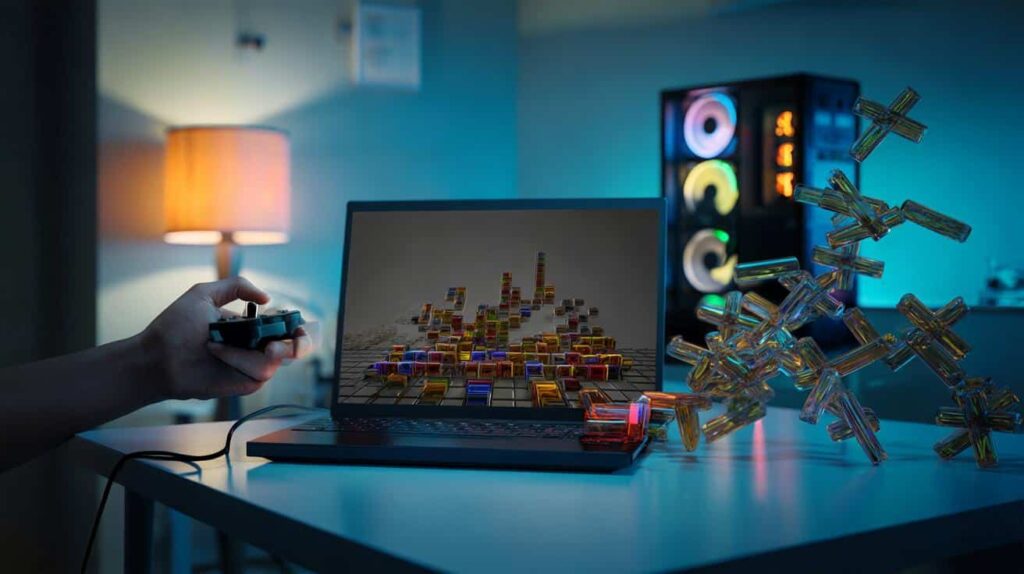Recent computational research indicates that it’s a complex mathematical landscape where “perfect” play is not only uncommon but essentially unattainable for any rapid algorithm. The concern isn’t that the game accelerates. It’s that the underlying problem does.
It begins quietly at a kitchen table, blue light illuminating the space, the gentle sound of a thumb nudging left-right-left as a J-piece sways into position. You’re partially syncing with the music, partially counting the gaps, convinced you have a neat stack until an S appears when you were expecting an I, based on your optimism rather than the preview. Two pieces later, your orderly wall has become a skyline of errors and near misses, and you can sense the clock devouring seconds like candy. Then the board ceases to be just a game.
When Simple Rules Give Rise to Impossible Problems
The rules are remarkably straightforward: rotate, drop, complete a line. Researchers consistently demonstrate that the mathematics concealed within those rules is more complicated than it appears, with worst-case Tetris objectives proving to be NP-hard or even PSPACE-hard depending on the variant. This may sound abstract until you understand that it implies no known quick method can ensure the best move for every conceivable future, not even if a supercomputer scrutinizes the board until dawn. The new studies don’t make Tetris more difficult; they uncover the difficulty that has always existed.
Imagine you know every piece you will ever receive, laid out in a perfect sequence. Even then, determining whether you can reach a certain height or clear a specific number of lines becomes a puzzle with overwhelming branches. A single 10-by-20 grid has an astronomical number of possible stacks, and each new piece expands the tree of choices like a deck scattered on the floor. AI agents delve deeply with clever evaluations, but the search still expands so rapidly that it resembles weather patterns more than math homework.
Here’s the crux: worst-case Tetris requires you to navigate through a maze where each step alters the maze behind you. NP-hard indicates that the optimal solution likely requires time that increases faster than any practical computer can manage; PSPACE-hard suggests that the very memory of planning may overwhelm you. **In Tetris, “unsolvable” signifies that no rapid perfect strategy exists for every sequence.** New computational studies continue to explore various factors—limited rotations, piece previews, bag randomizers—and the conclusion remains: the impossibility is indifferent to your quality-of-life preferences.
How to Think Like an Algorithm Without Overloading Your Mind
Begin with a small playbook and adhere to it. Maintain a single “well” for I-pieces, flatten your roof, and evaluate placements using three straightforward scores: total height, holes created, and bumpiness. If a choice creates holes, it incurs costs later, so favor moves that tidy the floor even if they don’t appear impressive. **Heuristics outperform perfection because the game won’t provide you with sufficient time or information to achieve perfection.** Utilize hold to gain breathing space, then spend that time eliminating unsightly ledges.
Common pitfalls are painfully human: pursuing a T-Spin shape that never fully materializes, constructing a cliff you intended to rectify “next piece,” or treating hold as a storage space instead of a tool. We’ve all experienced that moment when the stack seems fine, and then a single Z lands sideways, causing sweat to form in your palms. Use the preview to avert trouble, not to daydream about heroic moves. Let’s be honest: nobody truly does that every day.
“Complexity doesn’t prohibit action; it compels you to select good rules and accept their trade-offs.”
Create your own quick scoreboard and keep it close at hand:
- Favor placements that minimize holes, even if they elevate the roof slightly.
- Protect your well like a savings account; emergency funds are preferable to extravagant purchases.
- If two moves seem equally viable, choose the flatter one and reset the rhythm.
What This Reveals About AI, Work, and Everyday Choices
We are enamored with the notion that smarter code leads to flawless answers, yet Tetris conveys a different narrative about limitations and craftsmanship. The frontier isn’t a magical solution that eliminates uncertainty; it’s a collection of habits that manage uncertainty wisely, whether you’re stacking tetrominoes, prioritizing emails, or coordinating a product roadmap with five teams and a single deadline. In a world fixated on perfect answers, the most effective move is often a repeatable process that accommodates disorder. That’s not failure. It’s a style of play where you select a few heuristics, trust them under pressure, and forgive the board when it presents you with three S pieces consecutively and labels it random.
| Key Point | Detail | Reader Interest |
|---|---|---|
| Tetris is mathematically challenging | Variants are NP-hard or PSPACE-hard, even with previews and “hold” | Understanding why AI doesn’t “solve” the game and why the feeling of chaos is normal |
| Heuristics excel in real-time | Simple scores: holes, height, roughness; maintaining a well; disciplined use of “hold” | Transforming complexity into concrete actions that save games |
| Lessons beyond the game | No universal certainties, but routines that spend uncertainty wisely | Applying the “Tetris mindset” to daily decisions and work |
FAQ :
- Is Tetris truly unsolvable by computers?Not in the sense of “no move can be found,” but in the sense that no rapid algorithm can ensure perfect play for every sequence under standard complexity assumptions.
- Did researchers actually prove this?Yes, multiple papers demonstrate that Tetris variants are NP-hard or PSPACE-hard, and newer studies continue to extend the difficulty to realistic scenarios.
- Why do AIs still perform so well?They employ heuristics and search strategies to manage typical situations, which differs from guaranteeing optimal play in worst-case scenarios.
- Does more preview or a larger hold resolve the issue?Helpful in practice, but not a definitive solution in theory; the worst-case planning problem remains explosive.
- What should a casual player take away?Trust simple rules: minimize holes, maintain a clean roof, safeguard a well, and accept that uncertainty is part of the enjoyment.








